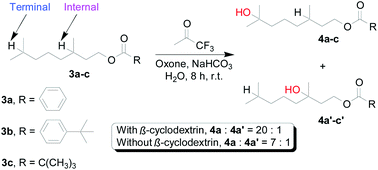Selective oxidation of unactivated C–H bonds by supramolecular control†
Abstract
Efficient methods for dioxirane-based selective C–H bond

* Corresponding authors
a
State Key Laboratory of Chirosciences and Department of Applied Biology and Chemical Technology, The Hong Kong Polytechnic University, Hung Hom, Hong Kong, China
E-mail:
bcmkwong@inet.polyu.edu.hk
Fax: +(852)2364 9932
Tel: +(852)3400 8701
Efficient methods for dioxirane-based selective C–H bond

 Please wait while we load your content...
Something went wrong. Try again?
Please wait while we load your content...
Something went wrong. Try again?
Y. Fung, S. Yan and M. Wong, Org. Biomol. Chem., 2012, 10, 3122 DOI: 10.1039/C2OB07069C
To request permission to reproduce material from this article, please go to the Copyright Clearance Center request page.
If you are an author contributing to an RSC publication, you do not need to request permission provided correct acknowledgement is given.
If you are the author of this article, you do not need to request permission to reproduce figures and diagrams provided correct acknowledgement is given. If you want to reproduce the whole article in a third-party publication (excluding your thesis/dissertation for which permission is not required) please go to the Copyright Clearance Center request page.
Read more about how to correctly acknowledge RSC content.
 Fetching data from CrossRef.
Fetching data from CrossRef.
This may take some time to load.
Loading related content
